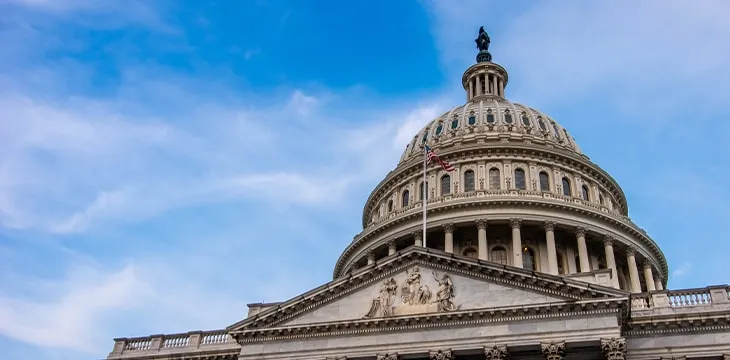|
Getting your Trinity Audio player ready...
|
Early last week, the former Chief of the SEC’s Office of Internet Enforcement, John Reid Stark, took to LinkedIn to express dismay that a legal hero of his had sold out to the digital currency lobby.
In his post, Stark explained how one of his role models, Obama-era SEC Chair Mary Jo White, is defending Ripple Labs in her new role as an attorney at Debevoise & Plimpton LLP.
It’s a story that is all-too familiar within the digital currency industry. One watchdog group called The Tech Transparency Project has listed 200+ former staffers of national political campaigns, congressional offices, and federal agencies who have walked through the revolving door from government positions to lucrative roles in the fast-growing digital currency sector.
In an era where there are widespread calls to get big money out of politics in order to protect democratic processes, ‘crypto’ is going the other direction.
The Wall Street Journal exposes how deep pockets are influencing Washington
Stark’s LinkedIn post was inspired by an article published by the Wall Street Journal on March 12. In it, the WSJ reported on how the digital currency industry is buying influence in Washington by hiring former government staffers such as Mary Jo White and many others.
The report identified that the digital currency industry has so far hired three former senators, three former SEC chairs, three former CFTC chairs, and one former White House chief of staff, among others. It’s an A-list squad of legal talent that can pull strings, influence lawmakers, and make sure that the big players who currently dominate the industry stay on top.
Why is the industry, notorious for its anti-government and anti-regulation sentiment, hiring so much legal firepower? It’s because regulations are in the process of being crafted to protect investors, stamp out illegal activity, and ensure that the notoriously volatile digital currency market can’t cause wider financial instability.
At such times, it’s crucial that lawmakers receive accurate information. Yet, given those doing the hiring, including entities like the Digital Currency Group, Jack Dorsey’s Block, and Binance, it’s unlikely that honest and truthful information will be flowing into the ears of regulators. It’s a classic case of an attempt at regulatory capture to ensure the big guns will remain in their positions for a long time to come.
The misinformation surrounding the digital currency industry is astonishing
Many of the people involved in all of this are hopelessly misinformed, such as former acting Comptroller of the Currency Brian Brooks, who accepted a high-paying job at Binance U.S. before quickly backtracking once he realized what he was involved with. Yet, there are others who are seeking to deceive and hide the truth about Bitcoin and other digital currencies.
This is a trend that has continued since Satoshi Nakamoto left the Bitcoin scene in 2010. Ever since the creator disappeared, untruths, misinformation, wishful thinking, and total and deliberate falsehoods have dominated the digital currency space. We’ve seen a totally incorrect narrative about what Bitcoin is taking root, and we’ve witnessed the proliferation of thousands of altcoins claiming to solve problems with Bitcoin that never existed in the first place.
It’s true that some of this is genuine confusion about complex, relatively new technology that few fully understand yet, but some of it is deliberate misinformation meant to obfuscate Bitcoin’s revolutionary potential. Firms like Mastercard and their venture capital fronts have deliberately paralyzed Bitcoin and mis-sold it as an investment asset to protect their interests. Companies like Coinbase, which generate endless fees from the trading of largely worthless and unnecessary tokens, are all too happy to go along with the lies to keep the river of cash flowing in their direction.
The truth about Bitcoin is hiding in plain sight
Yet, despite all of this, lawmakers and others need only read the writings of Satoshi Nakamoto to cut through the thick veil of lies and greed that have sent the majority down the wrong path. By studying Satoshi, they could easily learn that:
- Bitcoin is a peer-to-peer electronic cash system designed to facilitate micropayments. It is not an investment asset of any kind.
- It is infinitely scalable and is capable of complex smart contracts, rendering all altcoins unnecessary.
- The Bitcoin system was designed from the outset to comply with any and all existing regulations. No new regulations are needed.
- Bitcoin at scale was designed to end up in data centers, allowing law enforcement to freeze wallets, seize coins by legal order, and monitor the ledger for illegal activity.
- Satoshi had no interest in a system that facilitated illegal or dangerous activity. He spoke out against the formation of darknet drug markets and opposed using Bitcoin to fund Wikileaks.
Despite all of Satoshi’s patient explanations, the misunderstanding about Bitcoin has continued from the very day it was released. While the era of anarchists and criminals using Bitcoin as some sort of untraceable currency is slowly giving way to the era of Bitcoin as an investment asset class, the latter is just as harmful as the former. Mining economics mean Bitcoin cannot and will not survive if it is held in vaults as digital gold.
Lawmakers need to do only a few simple things; ignore the big-money influence peddlers, regulate Bitcoin by passing sensible, light-touch laws to make the industry comply with existing AML/KYC regulations.
No new laws or regulations are needed for Bitcoin itself. The only people who say otherwise are those with a vested interest in keeping the biggest scam in history running for their benefit. In time, Bitcoin will be understood by all, but for now, regulators and lawmakers need to wake up quickly and understand what they’re dealing with. Who better to learn from than the inventor himself?
https://www.youtube.com/watch?v=zmLfZ599oAY

 07-03-2025
07-03-2025 





